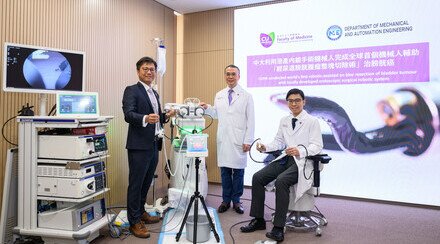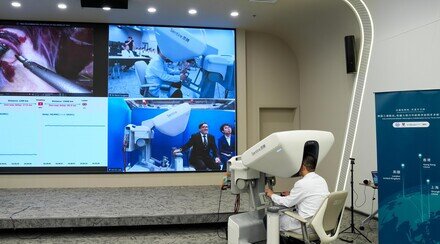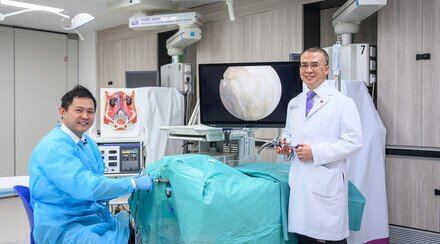CUHK introduces a new modular robotic surgery system in the Greater China region Initial trials in radical prostatectomy show satisfactory outcomes
The surgical urology team from The Chinese University of Hong Kong (CUHK)’s Faculty of Medicine (CU Medicine) introduced a new modular robotic system in a clinical trial in May this year, and have performed robotic radical prostatectomy 10 times at the Prince of Wales Hospital. This is the first time the novel surgical system has been tested in the Greater China region. Initial trials showed satisfactory outcomes.
New modular robotic system with higher mobility
Robotic surgery was first introduced in Hong Kong in 2005 in the Prince of Wales Hospital by the surgical team from CU Medicine. Since then, robotic surgery has been gradually adopted in different hospitals and is becoming the standard for many procedures, such as radical prostatectomy and partial nephrectomy. However, the current all-in-one system has its intrinsic limitations, such as not being mobile so that it could be transferred between operating theatres, and the pre-designed configuration of the robotic arms. Various new robotic systems have been developed to overcome some of these limitations.
.jpg)
The open console system allows the observation of a 3-D intraoperative view by other personnel.
The new modular robotic system’s new features include four robotic arms, each in its own individual cart to facilitate transportation and positioning, and an open console system that allows the observation of a 3-D intraoperative view by other personnel.

Dr Samuel Yee says the robotic arms can fit in different surgical tools depending on the procedures.
Dr Samuel Yee Chi-hang, Clinical Associate Professor (honorary), Division of Urology, Department of Surgery, CU Medicine, said, “The current multiport and single-port robotic systems are bulkier and more confined to theatre size, which limits their use in certain operating theatre settings, making it difficult for the systems to be used in different operating theatres according to the clinical needs of different surgical teams. The novel modular robotic system provides higher accessibility, with mobile robotic arms that can be transferred between operating theatres, and allows different robotic arms to be deployed in different types of surgery. The new modular robotic system and the current conventional robotic system can work hand-in-hand to help shorten patients’ waiting times for surgery as a result of better arrangement of operating theatres and resources.”
Initial results show satisfactory outcomes in patients

Mr Lam was diagnosed with prostate cancer after taking biopsy. The CU Medicine team performed radical prostatectomy with the novel modular surgery system in May for Mr Lam. He was discharged from hospital four days after the surgery and did not have any uncomfortable feeling.
In the initial stage, the CU Medicine team plans to use the novel system to treat prostate cancer and kidney cancer patients. The new robotic system has successfully performed 10 robotic radical prostatectomy cases. Radical prostatectomy is a surgery to remove the entire prostate gland and potentially the surrounding lymph nodes in order to treat men with localised prostate cancer.
No major complications were observed and the postoperative continence rate was very good, with half of the patients not requiring the use of any pads at one month after surgery. The research team compared the initial results with reported data on previous multiport and single-port robotic systems, and showed satisfactory results (refer to Table 1 for details).
Table 1: Performance of the novel modular robotic system in treating radical prostatectomy
Median operation time | About 182 minutes |
Blood loss | 200 ml |
Median time of hospital stay after surgery | 3 days |
Number of days for patients to take off their urethral catheter after surgery | Within 8 days |

Professor Ng Chi-fai says the new modular robotic system and the current conventional robotic system can work hand-in-hand for better arrangement of operating theatres and resources and advancement in minimally invasive surgery.
Professor Ng Chi-fai, Tzu Leung Ho Professor of Urology, Division of Urology, Department of Surgery, CU Medicine, said, “Other than advancement in accessibility, we observed that another advantage of the new robotic system is that it can be easily adopted by any surgeon with good robotic surgery experience, so there is no significant learning curve effect on the outcomes in patients. The open console system with a 3-D intraoperative view can also benefit training and demonstration in theatre.”
The initial trials were funded by Shun Hing Education and Charity Fund to support the new robotic system’s consumable use. The CU Medicine team wishes to conduct further trials on other procedures to test the system’s abilities.

























